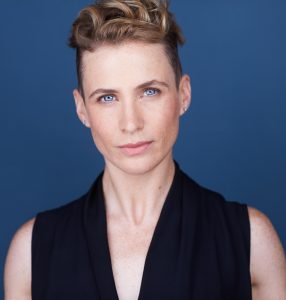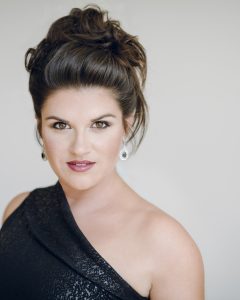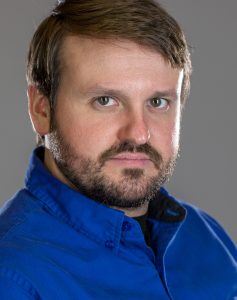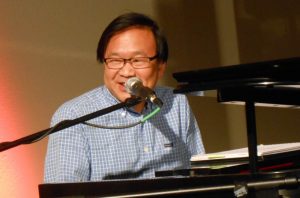One of the many things that we owe Mozart is his determination to wrest opera from the clutches of European nobility. Beginning with his 1782 Abduction from the Seraglio, a “singspiel” written in the language of the Viennese public, he helped establish opera as an art-form “for the people.” Opera has been striving to maintain that profile ever since.

Stage director Alison Moritz
This fall, perhaps for the first time in Kansas City’s history, audiences will have the opportunity to see operas from no fewer than three different companies. And they all have one thing in common: Each production is crafted to appeal to as broad an audience as possible. Mozart would have been pleased.
The Lyric Opera opens its season on September 21st with a fresh take on Mozart’s Abduction, set this time not in a Turkish harem but in an audience-friendly environment inspired by movies such as The Road to Morocco and Casablanca.
Two new companies also step to the plate: Starting September 21st, Landlocked Opera presents Berlioz’ Beatrice and Benedict, a concise adaptation of Shakespeare’s Much Ado About Nothing, and later this fall Opera180 will present an experimental opera by Michael Ching called Speed Dating Tonight!
HANGIN’ AT THE SERAGLIO
“What we wanted to do was figure out a way for our contemporary audiences to experience Mozart’s singspiel in the same way that his audiences would have,” said Alison Moritz, a St. Louis native who makes her Lyric directorial debut with a production she created last season at New Orleans Opera with KC-based set designer Steven C. Kemp. Rather than harken back to Mozart’s politically charged East-West dynamic, Alison has set the opera in a 1930s nightclub in Los Angeles: Our heroines are employees who can’t leave simply because they need the work. This way, Alison said, “the audience’s main experience is of Mozart’s really beautiful music.”

Steven Kemp, who has designed for stages all over the United States, created this ’30s-style set design originally for New Orleans Opera
Abduction is hardly a rarity on the stage, as it contains much of the explosive inspiration that Mozart felt upon his first arrival in Vienna from the hinterlands. Yet it remains problematical for modern sensibilities (as does the composer’s The Magic Flute, though for slightly different reasons) partly because of its story line: In its original telling, two white ladies, held captive by Turks with dubious intentions, must be rescued by their heroic European boyfriends before it’s, um, too late. It’s not surprising that directors these days find themselves fleeing toward more racially neutral interpretations.
“Pieces like The Magic Flute and Abduction are a conductor’s dream and a director’s nightmare,” Alison said, adding that her other lucky “partner” in this is one of America’s top opera conductors, Michael Christie. Abduction contains relatively little of the shrewd symbiosis of plot, character, and music of Mozart’s later Da Ponte trilogy (The Marriage of Figaro, Don Giovanni, and Così fan tutte), she said. “So the gravitas comes from the performances and the music, and not necessarily from the plot.”

Kathryn Lewek sings the role of Konstanze, with Kansas City native Ben Bliss as her love-interest, Belmonte
Alison and Steven have created a mafia-style nightclub called Seraglio, aided by a set that rotates to “peel away” layers until we find ourselves inside the heroine’s dressing room. Konstanze, the club’s main attraction, is a singer who hangs out with her friend, Blonde, who is a cocktail waitress.
“We started with the idea of the club,” Steven said, “and from there it kind of grew in the world of L.A. clubs like the Cocoanut Grove, the Copacabana, the Tropicana. … There is a mob overtone to it, a kind of gangster vibe. It’s a world in which it would be dangerous for the ladies to try to get out.”
Thus the team has intentionally retained some of the sinister nature of the men, who might indeed be just as dangerous as the fellows who “run” harems. “If you declaw it completely, if you take away all the danger, it’s really kind of like a candy-box,” Alison said. “The music is pretty but there’s not a lot of ‘there,’ there.” Nevertheless, she said she does try to downplay Konstanze’s “chastity: Here it’s not so much a matter of whether she has remained faithful to Belmonte, but whether she still loves him. “It’s more about her choice than it is about her chastity,” the director said. “As a contemporary woman, if I’m watching a show in which that is completely pivotal to the plot, I could find that potentially unsettling.”
Such fine points are critical to making bizarrely satirical works that might have seemed hilarious two centuries ago coherent to a modern audience. “I consider my role as the first advocate for the audience,” Alison said, “as someone who helps to kind of mediate the relationship between the performance onstage and the audience. … We have so few opportunities for this kind of emotional connection and intimacy in our everyday lives, and opera is one of the most immediate hits of catharsis that you can experience—and in a way that is really life-affirming for me, as well.”
LANDLOCKED BUT NOT LOCKED OUT
Christina and Jonathan Ray, who formed Landlocked Opera last year, might echo that sentiment, and they are as passionate about opera as anyone in our region. For the Rays, though, the emphasis is on intimate (and inexpensive) spaces that permit audiences to focus on storytelling. “We have the flexibility to do repertoire that maybe not everybody’s heard of or seen before,” said Christina. “We don’t need huge production values: We’re just hoping to be able to sing and tell the story.” (Landlock’s performance home is Atonement Lutheran Church.)
“We’re hoping to do away with the stodgy associations that people have with opera,” Jonathan added. “Make it approachable … a sort of come-as-you-are endeavor for those who maybe have never seen an opera.”

The Rays will alternate with other singers in the title roles of ‘Beatrice and Benedict’

Jonathan recently finished doctoral studies in vocal performance and choral conducting at LSU
They are also focused on using local singers to the extent possible, Christina said, because “it’s a great experience for an audience, being able to see people from your own community onstage: to be able to say, I know that person!’ ”
Landlocked ticket prices are also within a range that everyone can afford ($10), and many opera lovers will be attracted by the intimacy of a space such as that at Atonement.
Berlioz’ Beatrice is a relative rarity, but because it’s essentially a stripped-down retelling of one of Shakespeare’s most delightful plays it can work effectively in unconventional spaces. The Rays were a bit nervous about finding singers for it until they announced auditions: No fewer than 52 artists showed up, and another dozen or so sent videos. “It was better than we could ever have hoped for,” Jonathans said. “The hope is to just grow and grow.”
ABOUT-FACE!
Opera180 also takes an audacious step this fall: Speed Dating Tonight! is pretty much what it sounds like: “It revolves around the lives and antics of a group of people attending a local speed dating event,” said Nate Wheatley, who co-founded Opera180 with Sadie DeSantis and others to present both re-envisioned classics and contemporary works. “These characters range from sentimental people in search of love to narcissistic personalities and some comical characters to boot.”
The production (whose venue and dates are still in the works) fits Opera180’s mission in several ways, Nate said: “It is in English, the music is very accessible, the subject matter is relatable to many, and it allows great versatility in location as well diverse casting.”

Michael Ching / Photo by Nancy Smith Blackwell
Composer Michael Ching has come up with an incredibly clever idea for an opera, Nate added. “The audience experiences a traditional speed-dating setting where the opera is performed through a series of vignettes (the dates) but the audience also meets a waiter/waitress, a bus boy/girl, the speed-dating coordinator, and the bartender. Hilarity will ensue!”
Opera180’s recent site-specific production of La Bohème, held at Weinberger Fine Art in the Crossroads District this summer, was a hit. And Opera180 hopes to keep doing works that are as far outside the operatic “box” as possible. “Our patrons are intrigued, and we are committed to this journey!” said Nate, who also works as a lighting designer for companies around the country. “One patron told us that she had attended Bohème numerous times before, but this was the first time she shed tears at the end. New patrons told us how much they loved the casual atmosphere and the intimacy of the setting. … And they were astounded by the power of the human voice.”
For tickets to the Lyric Opera, call 816-471-7344 or go to kcopera.org. For Landlocked Opera go to landlockedopera.org and for Opera180 go to opera180.org.
—By Paul Horsley
To reach Paul Horsley, performing arts editor; send an email to paul@kcindependent.com or find him on Facebook or Twitter (@phorsleycritic).
